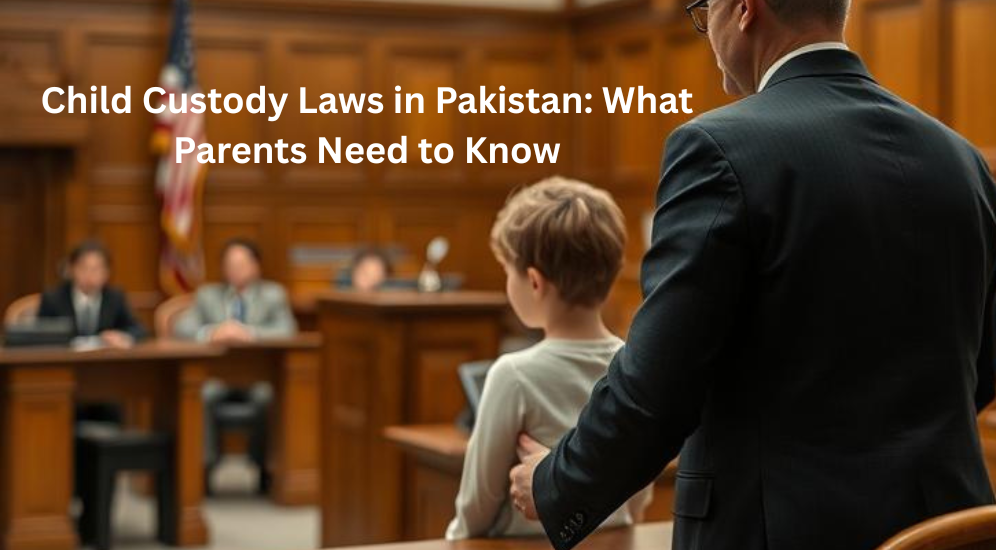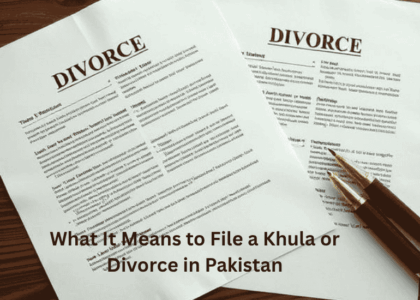Going through a divorce or separation is tough, especially when children are involved. As a parent, you want what’s best for your child, but navigating Child Custody Laws in Pakistan can feel overwhelming. I’ve seen families struggle with these issues firsthand while working with legal professionals in Islamabad. My goal here is to break down the laws, processes, and practical tips in a way that’s clear, engaging, and easy to understand. Whether you’re a mother, father, or grandparent, this guide will help you understand child custody in Pakistan and make informed decisions for your child’s future.
Introduction: Understanding Child Custody in Pakistan
Child custody disputes often arise after a divorce or separation, leaving parents wondering about their rights and responsibilities. In Pakistan, the legal system blends Islamic principles with statutory laws, primarily the Guardians and Wards Act of 1890, to prioritize the child’s welfare. Knowing your rights as a parent can make a huge difference in navigating custody after divorce or separation. Let’s dive into the basics to set the stage.
What is Child Custody Under Pakistani Law?
Child custody refers to the legal and practical responsibility of raising a child. It includes deciding where the child lives, their education, healthcare, and overall upbringing. In Pakistan, the Guardian Court Islamabad and other family courts handle these cases, always focusing on what’s best for the child. Custody isn’t just about physical care—it also involves legal decision-making power.
Key Terminology: Hizanat vs. Guardianship
Two important terms you’ll hear are Hizanat and Willayat (guardianship):
- Hizanat: This refers to physical custody, usually granted to the mother for young children. It means taking care of the child’s daily needs, like food, shelter, and emotional support.
- Willayat: This is legal guardianship, often given to the father, involving major decisions like finances, education, and religious upbringing.
Understanding these terms helps clarify the roles of each parent in a custody arrangement.
Types of Custody Under Pakistani Law
Custody in Pakistan comes in different forms, depending on the child’s needs and the parents’ circumstances. Here’s a breakdown:
Physical Custody
Physical custody determines where the child lives day-to-day. The court may award this to one parent (usually the mother for young children) or, in rare cases, to both parents if they live close and cooperate well.
Legal Custody
Legal custody gives a parent the right to make big decisions about the child’s life, like schooling, medical care, and religion. Fathers are often considered the “natural guardians” for legal custody, but courts can grant it to mothers if it’s in the child’s best interest.
Temporary vs. Permanent Custody
- Temporary Custody: This is a short-term arrangement, often decided early in a custody case under Section 12 of the Guardians and Wards Act. It’s meant to ensure stability while the court reviews the case.
- Permanent Custody: This is the final custody order, decided after hearings and evidence. It can still be changed later if circumstances shift.
Mother’s Custody Rights in Pakistan
Mothers often have a strong position in father vs. mother custody rights cases, especially for young children, due to Islamic principles and legal precedent.
Legal Age Limits for Mother’s Custody (Sons and Daughters)
Under Islamic law (Hanafi school, followed by most Pakistani courts):
- Sons: Mothers typically have custody until the boy is 7 years old. After that, custody may shift to the father, but only if it’s in the child’s best interest.
- Daughters: Mothers retain custody until the girl reaches puberty (around 12–16 years). Courts prioritize a mother’s nurturing role during these years.
These age limits aren’t set in stone. Courts can extend a mother’s custody if the child’s welfare demands it.
Grounds on Which a Mother Can Lose Custody
A mother may lose custody if the court finds her unfit, for example:
- Neglecting the child’s emotional or physical needs.
- Engaging in behavior deemed “objectionable” (e.g., proven criminal activity or substance abuse).
- Remarrying someone unrelated to the child, though this alone isn’t enough unless it harms the child.
I’ve seen cases where mothers retained custody despite remarriage because they proved a stable, loving environment for the child.
Father’s Custody and Guardianship Rights
Fathers play a critical role in custody cases, often as the financial provider and legal guardian.
Role of the Father as Natural Guardian
Under Pakistani law, fathers are considered the “natural guardians” of their children, responsible for their financial support and major life decisions. Even if a mother has physical custody, the father retains guardianship unless proven unfit.
When and How Fathers Can Claim Custody
Fathers can file for custody under the Guardians and Wards Act if:
- The mother is deemed unfit.
- The child (son over 7 or daughter past puberty) would benefit from the father’s care.
- The father can provide a better environment (e.g., education, stability).
Fathers must present evidence in court, like financial records or proof of a nurturing home, to win custody.
What Courts Consider in Child Custody Cases
The guiding principle in all custody cases is the best interest of the child principle. Courts look at several factors to decide what’s best.
Factors: Education, Emotional Needs, Health, Environment
Judges evaluate:
- Education: Which parent can ensure better schooling?
- Emotional Needs: Who provides a loving, supportive environment?
- Health: Can the parent meet the child’s medical needs?
- Environment: Is the home safe and stable?
I recall a case in Islamabad where a father won custody of his 8-year-old son because he could afford a better school and proved the mother’s home was unstable due to frequent moves.
Islamabad Family Courts: How the Custody Process Works
If you’re in Islamabad, here’s how the Guardian Court Islamabad handles custody cases.
Step-by-Step Custody Procedure in Islamabad
- Filing a Petition: The parent seeking custody files a petition in the family court, including documents like the child’s birth certificate and marriage/divorce papers.
- Court Hearings: Both parents present evidence and witnesses. The court may appoint a child welfare officer to assess the child’s living conditions.
- Temporary Orders: The court may issue temporary custody while the case is ongoing.
- Final Decision: After reviewing all evidence, the judge issues a permanent custody order.
Role of Guardianship Judges
Guardianship judges act like a “parent” to the child, prioritizing their welfare above all else. They have wide discretion to make decisions based on the case’s unique facts.
Can Children Choose Which Parent to Live With?
Age of Choice Under Pakistani Law
Courts may consider a child’s preference if they’re mature enough—typically around 10–12 years old. The child must show they understand their choice and its impact.
When a Child’s Preference is Taken Into Account
A child’s preference isn’t binding but carries weight if they’re rational and the choice aligns with their welfare. For example, a 13-year-old girl in a Lahore case was allowed to stay with her mother because she felt safer there.
Joint Custody in Pakistan: Is It Possible?
Legal Possibilities and Limitations
Joint custody, where both parents share physical and legal responsibilities, is rare in Pakistan. Courts prefer one parent to have primary custody to avoid conflict. However, some modern judges have allowed joint parenting arrangements if parents cooperate well.
Case Law and Trends in Joint Parenting
Recent cases show a slow shift toward shared parenting, especially in urban areas like Islamabad. Still, joint custody requires both parents to prove they can work together without harming the child.
How Visitation Rights Work
Court Orders for Visitation
The non-custodial parent (often the father) usually gets visitation rights, like meeting the child once or twice a month for a few hours. Courts may set a schedule, sometimes within court premises.
What Happens if a Parent Blocks Visitation?
If a parent blocks visitation, the other can file a contempt of court petition. The court may enforce the visitation order or even revise custody if the blocking persists. I’ve seen custodial parents warned by judges for denying visitation without valid reasons.
Changing Custody Orders: Is It Allowed?
Modification of Existing Custody Arrangements
Custody orders can be changed if there’s a significant change in circumstances, like a parent’s remarriage, relocation, or neglect. You must file a petition to modify the order.
Legal Procedure for Revising Court Orders
The process is similar to the initial custody case: file a petition, present evidence, and attend hearings. The court will only revise the order if it benefits the child.
Custody Battles: Tips for Parents in Islamabad
How to Strengthen Your Case
- Show Stability: Prove you can provide a safe, nurturing home.
- Focus on the Child: Highlight how you meet the child’s emotional and physical needs.
- Hire a Good Lawyer: A skilled family lawyer can make or break your case.
What Not to Do During Custody Proceedings
- Don’t badmouth the other parent in front of the child or court.
- Avoid missing court dates or ignoring court orders.
- Don’t let personal grudges cloud your focus on the child’s welfare.
Role of Islamic Principles in Custody Decisions
Hanafi School and Interpretation by Courts
Most Pakistani courts follow the Hanafi school of Islamic law, which gives mothers custody of young children and fathers guardianship. However, courts can deviate if the child’s welfare requires it.
Religious Upbringing and Custody Rights
Courts consider the child’s religious upbringing, ensuring the custodial parent respects Islamic values. This is especially relevant in cases involving non-Muslim parents or mixed marriages.
FAQs: Common Questions About Child Custody in Pakistan
Can Grandparents File for Custody?
Yes, grandparents can file for custody if both parents are unfit or unavailable (e.g., deceased). The court will still prioritize the child’s welfare.
What Happens if One Parent Lives Abroad?
If one parent lives abroad, courts may grant custody to the parent in Pakistan for stability but allow visitation or virtual contact with the non-resident parent.
Is Custody Different After Divorce vs. Khula?
No, custody after divorce or khula follows the same legal process. Khula (a wife-initiated divorce) doesn’t affect a mother’s custody rights unless she’s proven unfit.
Legal Help: Finding a Child Custody Lawyer in Islamabad
How to Choose the Right Family Lawyer
Look for a lawyer with:
- Experience in family law and custody cases.
- Good communication and empathy.
- A track record of success in Islamabad’s guardian courts.
Resources and Contacts in Islamabad
You can contact the Islamabad Bar Association or family law firms like Burhan & Associates for expert guidance. Many offer free initial consultations.
Conclusion: What Parents Must Know and Prepare For
Navigating child custody in Pakistan is challenging, but understanding the law empowers you to make the best choices for your child. The Guardian Court Islamabad and other family courts focus on the child’s welfare, so your case should highlight how you meet those needs. Whether you’re fighting for custody or visitation, stay calm, gather evidence, and work with a trusted lawyer. Your child’s happiness and stability depend on it.
By preparing well and knowing your rights, you can face this process with confidence. If you’re in Islamabad, reach out to a family lawyer today to start building your case. Your child deserves the best, and you can make that happen.





